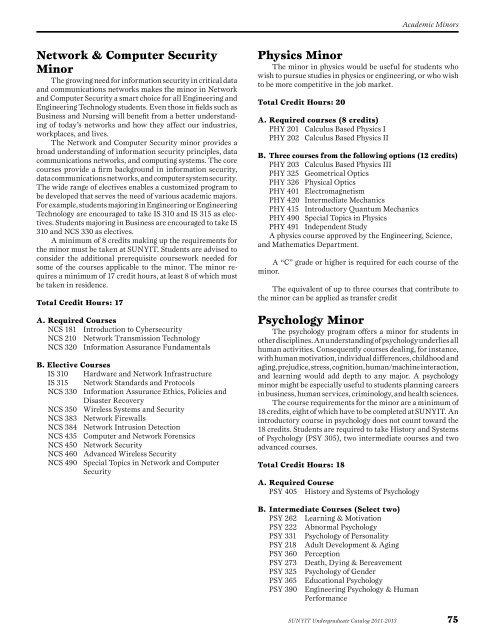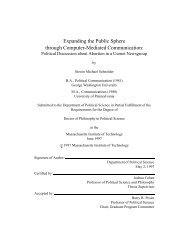Undergraduate Catalog 2011-2013 - SUNY Institute of Technology
Undergraduate Catalog 2011-2013 - SUNY Institute of Technology
Undergraduate Catalog 2011-2013 - SUNY Institute of Technology
You also want an ePaper? Increase the reach of your titles
YUMPU automatically turns print PDFs into web optimized ePapers that Google loves.
Academic Minors<br />
Network & Computer Security<br />
Minor<br />
The growing need for information security in critical data<br />
and communications networks makes the minor in Network<br />
and Computer Security a smart choice for all Engineering and<br />
Engineering <strong>Technology</strong> students. Even those in fields such as<br />
Business and Nursing will benefit from a better understanding<br />
<strong>of</strong> today’s networks and how they affect our industries,<br />
workplaces, and lives.<br />
The Network and Computer Security minor provides a<br />
broad understanding <strong>of</strong> information security principles, data<br />
communications networks, and computing systems. The core<br />
courses provide a firm background in information security,<br />
data communications networks, and computer system security.<br />
The wide range <strong>of</strong> electives enables a customized program to<br />
be developed that serves the need <strong>of</strong> various academic majors.<br />
For example, students majoring in Engineering or Engineering<br />
<strong>Technology</strong> are encouraged to take IS 310 and IS 315 as electives.<br />
Students majoring in Business are encouraged to take IS<br />
310 and NCS 330 as electives.<br />
A minimum <strong>of</strong> 8 credits making up the requirements for<br />
the minor must be taken at <strong>SUNY</strong>IT. Students are advised to<br />
consider the additional prerequisite coursework needed for<br />
some <strong>of</strong> the courses applicable to the minor. The minor requires<br />
a minimum <strong>of</strong> 17 credit hours, at least 8 <strong>of</strong> which must<br />
be taken in residence.<br />
Total Credit Hours: 17<br />
A. Required Courses<br />
NCS 181 Introduction to Cybersecurity<br />
NCS 210 Network Transmission <strong>Technology</strong><br />
NCS 320 Information Assurance Fundamentals<br />
B. Elective Courses<br />
IS 310 Hardware and Network Infrastructure<br />
IS 315 Network Standards and Protocols<br />
NCS 330 Information Assurance Ethics, Policies and<br />
Disaster Recovery<br />
NCS 350 Wireless Systems and Security<br />
NCS 383 Network Firewalls<br />
NCS 384 Network Intrusion Detection<br />
NCS 435 Computer and Network Forensics<br />
NCS 450 Network Security<br />
NCS 460 Advanced Wireless Security<br />
NCS 490 Special Topics in Network and Computer<br />
Security<br />
Physics Minor<br />
The minor in physics would be useful for students who<br />
wish to pursue studies in physics or engineering, or who wish<br />
to be more competitive in the job market.<br />
Total Credit Hours: 20<br />
A. Required courses (8 credits)<br />
PHY 201 Calculus Based Physics I<br />
PHY 202 Calculus Based Physics II<br />
B. Three courses from the following options (12 credits)<br />
PHY 203 Calculus Based Physics III<br />
PHY 325 Geometrical Optics<br />
PHY 326 Physical Optics<br />
PHY 401 Electromagnetism<br />
PHY 420 Intermediate Mechanics<br />
PHY 415 Introductory Quantum Mechanics<br />
PHY 490 Special Topics in Physics<br />
PHY 491 Independent Study<br />
A physics course approved by the Engineering, Science,<br />
and Mathematics Department.<br />
A “C” grade or higher is required for each course <strong>of</strong> the<br />
minor.<br />
The equivalent <strong>of</strong> up to three courses that contribute to<br />
the minor can be applied as transfer credit<br />
Psychology Minor<br />
The psychology program <strong>of</strong>fers a minor for students in<br />
other disciplines. An understanding <strong>of</strong> psychology underlies all<br />
human activities. Consequently courses dealing, for instance,<br />
with human motivation, individual differences, childhood and<br />
aging, prejudice, stress, cognition, human/machine interaction,<br />
and learning would add depth to any major. A psychology<br />
minor might be especially useful to students planning careers<br />
in business, human services, criminology, and health sciences.<br />
The course requirements for the minor are a minimum <strong>of</strong><br />
18 credits, eight <strong>of</strong> which have to be completed at <strong>SUNY</strong>IT. An<br />
introductory course in psychology does not count toward the<br />
18 credits. Students are required to take History and Systems<br />
<strong>of</strong> Psychology (PSY 305), two intermediate courses and two<br />
advanced courses.<br />
Total Credit Hours: 18<br />
A. Required Course<br />
PSY 405 History and Systems <strong>of</strong> Psychology<br />
B. Intermediate Courses (Select two)<br />
PSY 262 Learning & Motivation<br />
PSY 222 Abnormal Psychology<br />
PSY 331 Psychology <strong>of</strong> Personality<br />
PSY 218 Adult Development & Aging<br />
PSY 360 Perception<br />
PSY 273 Death, Dying & Bereavement<br />
PSY 325 Psychology <strong>of</strong> Gender<br />
PSY 365 Educational Psychology<br />
PSY 390 Engineering Psychology & Human<br />
Performance<br />
<strong>SUNY</strong>IT <strong>Undergraduate</strong> <strong>Catalog</strong> <strong>2011</strong>-<strong>2013</strong> 75
















